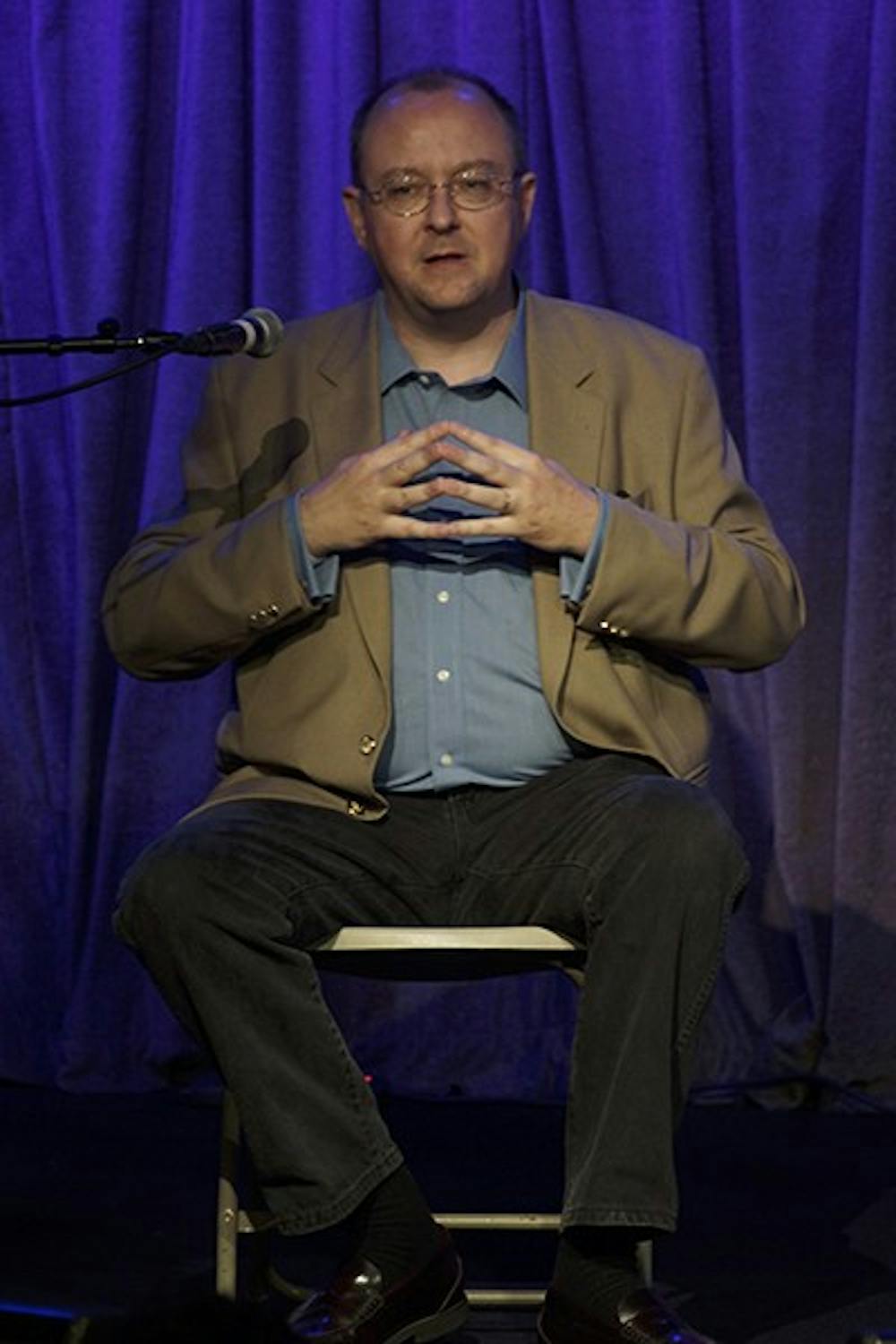 Madeline Ashby discusses the idea of border security and how "walls are meant to keep us in" during the Hieroglyph event at Crescent Ballroom in downtown Phoenix on Oct. 22, 2014. (Photo by Stephanie Specht)
Madeline Ashby discusses the idea of border security and how "walls are meant to keep us in" during the Hieroglyph event at Crescent Ballroom in downtown Phoenix on Oct. 22, 2014. (Photo by Stephanie Specht)
Members of Project Hieroglyph from ASU's Center for Science and the Imagination celebrated the publishing of their anthology"Hieroglyph" Wednesday at the Crescent Ballroom in downtown Phoenix.
Twenty leading thinkers and writers delved into the world of science fiction to explore the potential of the genre in understanding how scientific development can positively influence society in the new anthology, Director of the Center for Science and the Imagination Ed Finn said.
"Three years later we had a number of really fantastic writers come together to come up with a set of stories to inspire someone to go and build things," said Finn, "The book you hold in your hands is hopefully is a distillation of those ideas."
At the event, both writers and speakers used topics proposed in the book to create a natural dialogue between contributors.
"It required (the writers) to come and take a leap and play," said Finn, "The book is an invitation to come be a part of this discussion. It's not just about this book, or the ideas we have so far, but how we can make the world better."
Global health sophomore Matt Gomez said he found out about the event through information shared by Barrett, the Honors College and thought it would be fun opportunity.
"I consider myself to be a futurist and I thought this would be a good chance to hear about more ideas from science fiction, which in the past has been really good at showing what is going to happen for us," he said.
Authors and researchers Kim Stanley Robinson and Paul Davies looked at the idea of time travel as an academic opportunity, with true potential to be engaged and explored. Davies said he believed this capability to be true.
"Travel into the future is possible. " he said, "We've done it before though not in the quantity seen in Doctor Who which would be quite expensive. Traveling back in time we'd have to be a truly advanced civilization."
Robinson, who has written fiction on time travel, engaged with time travel in a much different way however.
 James L. Cambias,inventor of Zygote Games, discussed role playing games and love during the Hieroglyph event at Crescent Ballroom in downtown Phoenix on Oct. 22, 2014. (Photo by Stephanie Specht)
James L. Cambias,inventor of Zygote Games, discussed role playing games and love during the Hieroglyph event at Crescent Ballroom in downtown Phoenix on Oct. 22, 2014. (Photo by Stephanie Specht)
"I thought of time travel as a metaphor to explain our disjointed and irregular perception of time," he said, "This relative feeling of time is often literalized in science fiction and time travel is a very good literary tool to look at our lives."
Another writer, Karl Schroeder, wrote a very different piece looked at the future of governance. He suggested that in a science driven future we could change how decisions are made.
"If you start talking about improving government, people start getting uneasy, just like when you criticize human nature." he said.
Schroeder said this made him want to explore the way the government can change in little realistic ways, despite the opposition in society.
"We may not fix it, or get rid of everything in our present government, but we could tweak it. Fix it," he said. "Make tiny improvements."
Chemistry freshman Luke Tasker said he was impressed with the variety in the presentations.
"I thought it was really good. There were a lot of different ideas but they all linked really well," he said.
At the conclusion of the presentations, Finn brought the issues to back to reality.
"We are already living in a science fiction universe. We already have a terrorist group that looks like it came out of a James Bind film. We need to change this." Finn said, "(This project) isn't just about having a conversation but about really turning these ideas into something tangible."
CORRECTION: Due to a reporting error, a previous version of this article misspelled Paul Davies name. This version has been updated with the proper spelling.
Reach the reporter at rtashboo@asu.edu or follow her on twitter at @Rachael_Ta
Like The State Press on Facebook and follow @statepress on Twitter.




